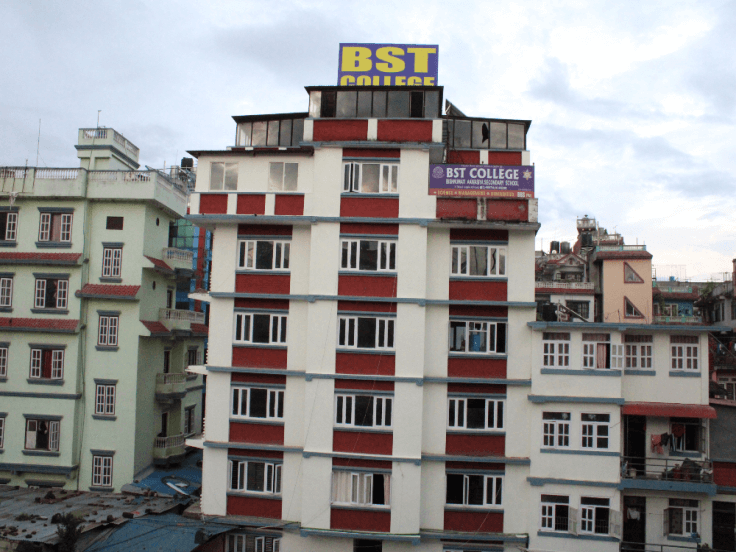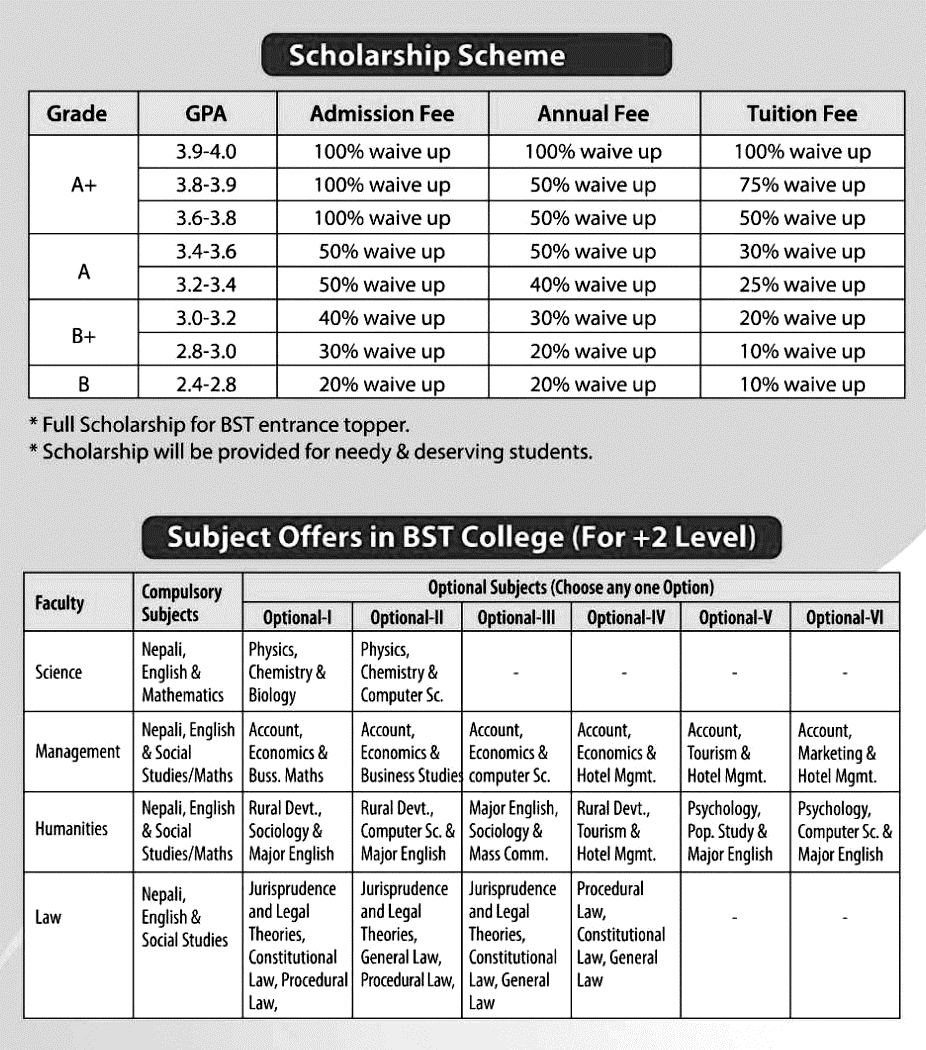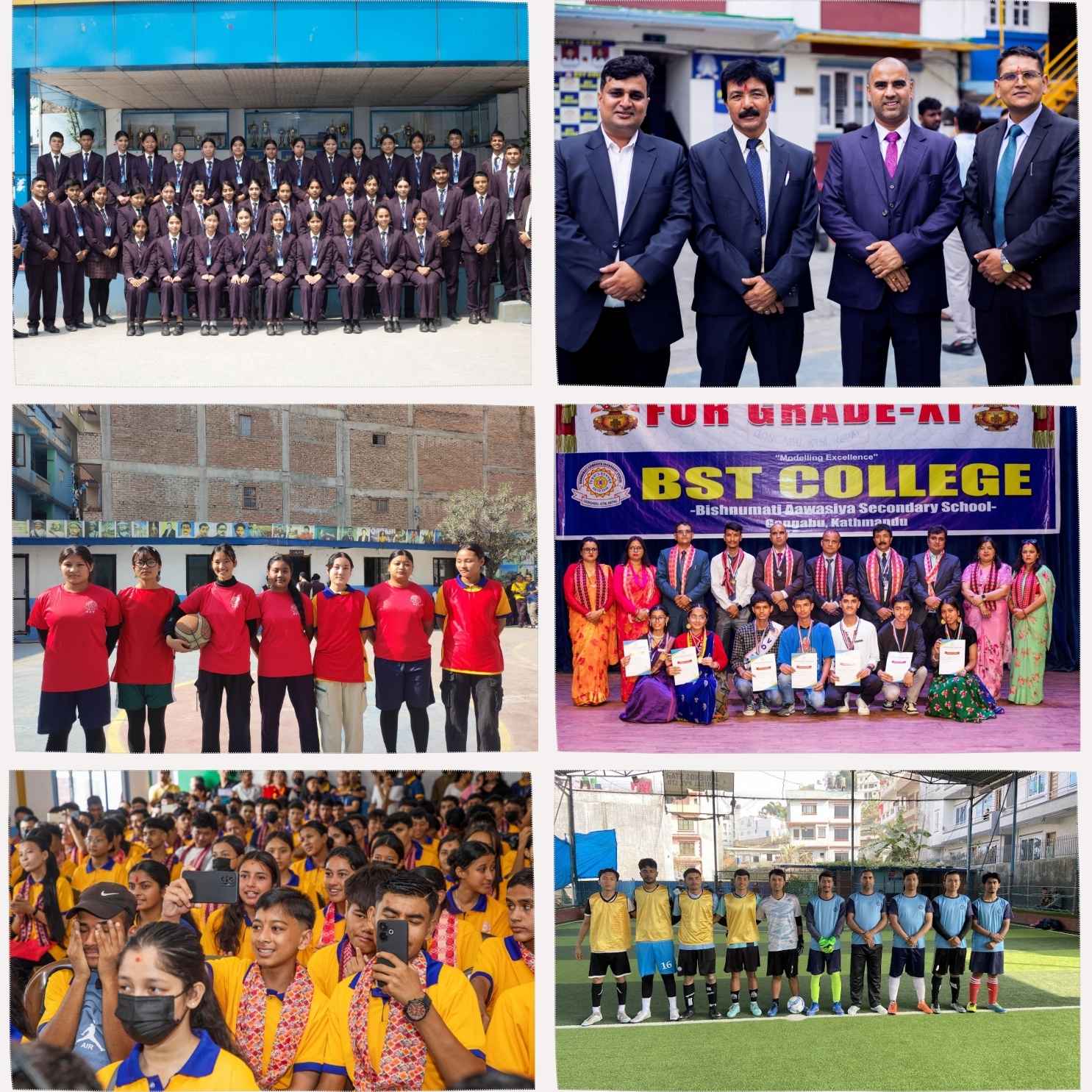Overview
BST College in Gongabu, Kathmandu—also known as Bishnumati Aawasiya Secondary School (College Section)—runs NEB Grade 11–12 (+2) and Tribhuvan University’s Bachelor of Business Studies (BBS). Opened in 2002, it offers +2 streams in Science, Management, Humanities, and Law, along with a TU BBS program. Students choose subject combinations in line with NEB rules, apply after SEE through a straightforward process, and may qualify for GPA-linked scholarships.
Teaching is classroom-based with regular practical work where it matters. The campus includes science labs, a computer lab, a hotel management lab, a library, an auditorium, transport services, and spaces for sports. At bachelor level, the BBS follows the syllabus prescribed by Tribhuvan University, covering accounting, economics, finance, business law, research methods, and a final project. This brief overview is meant to help students and families scan the options, match eligibility, and plan the next step with clear information.

Quick Highlights
-
Established: 2002 (College section; sister school since 2048 B.S.)
-
Location: Gongabu, Kathmandu.
-
Affiliations: NEB for +2; Tribhuvan University (Faculty of Management) for BBS.
-
Programs: +2 (Science, Management, Humanities, Law), BBS (TU).
-
Admission Windows: After SEE (+2); TU calendar for BBS.
-
Facilities: Science labs, computer lab, hotel management lab, library, auditorium, canteen, transportation, sports.
-
Scholarships: GPA-based waivers and merit support; entrance topper provision.
Academic Programs Offered

NEB Grade 11–12 (+2)
Streams and subject combinations
-
Science: Compulsory Nepali, English, Mathematics; electives drawn from Physics, Chemistry, Biology or Computer Science.
-
Management: Compulsory Nepali, English, Social Studies/Mathematics; electives may include Accountancy, Economics, Business Mathematics/Studies, Computer Science, Hotel Management, Marketing, Tourism & Mountaineering Studies.
-
Humanities: Compulsory Nepali, English, Social Studies/Mathematics; electives may include Rural Development, Sociology, Major English, Mass Communication, Psychology, Population Studies, Computer Science, Tourism, Hotel Management.
-
Law: Compulsory Nepali, English, Social Studies; electives drawn from Jurisprudence/Legal Theories, Constitutional Law, General Law, Procedural Law.
Eligibility
-
Science group: Minimum GPA 2.0; C+ in English, Science, Mathematics.
-
Other groups: The college material indicates a threshold around GPA 1.6 with subject-wise minimums.
These reflect internal admission standards published by the college and are consistent with common NEB practices adopted by many schools in recent years. Applicants should confirm the exact year-specific criteria during application.
NEB introduced a subject-basket approach in the recent curriculum shift; schools still present clear groupings for clarity. Students are advised to verify current year subject mapping and any revised grade thresholds at the time of admission.
Bachelor of Business Studies (BBS)
Program scope
BBS is a four-year annual program of Tribhuvan University’s Faculty of Management. It covers managerial accounting, economics, business law, finance, organizational behavior, taxation/auditing, entrepreneurship, research methods, and a final project. The framework and course codes mirror TU’s standard curriculum across constituent and affiliated campuses.
Indicative curriculum structure (TU standard)
-
First Year (500 marks): Business English (MGT 201), Business Statistics (MGT 202), Microeconomics for Business (MGT 203/207—campus listings vary), Accounting for Financial Analysis & Planning (MGT 211), and Principles of Management (MGT 213).
-
Second Year (500 marks): Business Communication (MGT 205), Macroeconomics (MGT 206), Cost & Management Accounting (MGT 212), Fundamentals of Financial Management (MGT 215), Organizational Behaviour & HRM (MGT 223).
-
Third Year (500 marks): Business Law (MGT 204), Fundamentals of Financial Management (MGT 215—repeated in some legacy lists; verify with current TU outline), Business Environment & Strategy (MGT 217), Taxation & Auditing (MGT 218), Organizational Behavior (MGT 219).
-
Fourth Year (500 marks): Entrepreneurship & Enterprise Development (MGT 220), Business Research Methods (MGT 221), Final Project (MGT 401), plus concentration courses (three papers in chosen area).
Eligibility
Completion of 10+2 or equivalent. The college’s information mentions second division (≥45%) or CGPA about 1.8 as the threshold. Cross-check with TU’s current BBS intake notice when applying, as TU periodically updates formatting while retaining the broad entry standard.
Admission Process
+2 (NEB)
-
Application window: Opens after SEE results. Forms and information are issued from the college help desk upon fee payment.
-
Documents: SEE grade sheet, character certificate, passport photos, and other school-requested materials.
-
Entrance assessment: The college may conduct an internal test/interaction. Shortlisted applicants proceed to admission.
-
Subject mapping: Students finalize combinations within the allowed basket for Science/Management/Humanities/Law.
-
Enrollment: Fee payment, section allocation, and orientation.
BBS (TU)
-
Application: As per college schedule aligned with TU calendar; submit +2 certificates and required documents.
-
Screening: Review of minimum eligibility and any internal interaction if prescribed.
-
Seat confirmation: Follow the college’s admission notice for fee deposit and section assignment.
Teaching Faculty and Learning Methodology
-
Faculty composition: The college reports a mix of experienced teachers across +2 and BBS. Faculty allocations by subject/ level are maintained internally; updated rosters are generally published each session.
-
Classroom approach: Text-centered delivery is supplemented with practical sessions, peer learning, presentations (BBS), and counseling for stream progression and career planning.
-
Industry/field exposure: Science lab activities, hotel management practicals, field visits, and academic talks occur during the session as scheduled by departments.
-
Assessment: NEB board exams for +2; TU annual exams for BBS with internal work and project components per TU framework.
Infrastructure and Learning Facilities
-
Auditorium/Stage: Venue for seminars, orientations, and cultural/academic programs with AV support.
-
Science labs: Dedicated laboratories for Physics, Chemistry, Biology with equipment for standard +2 practicals and guided experiments.
-
Computer lab: ICT facility with internet access and segmented practical spaces; basic usage code of conduct is in place.
-
Hotel management lab: Space for food production/service practicums led by resource persons from the sector.
-
Library: Reading rooms, circulation, and a reading-habit program; e-library plan mentioned in the college material.
-
Canteen: On-campus dining facility.
-
Transportation: Bus routes with attendant support and safety protocols.
-
Sports: Provision for physical activities and games.
Student Life and College Experience

College life features academic clubs/events, practical workshops, periodic field trips (e.g., hotel visits for Management/Hotel Management, science excursions), and orientation programs.
Day-to-day activities focus on class engagement, regular assignments, and thematic events.
The library’s “reader of the month” practice encourages reading culture. Applicants should request the annual calendar for current-year dates.
Extracurricular Activities (ECA)
-
Academic talks, workshops, quiz activities
-
Cultural programs and student performances in the auditorium
-
Hikes/field visits linked to Management and Humanities themes
-
Sports and fitness activities scheduled in the academic calendar
Scholarships and Financial Support
GPA-based waivers:
-
A+ (GPA 3.9–4.0): Admission, annual, and tuition fees fully waived.
-
3.8–3.9: Admission 100%; annual 50%; tuition 75% waived.
-
3.6–3.8: Admission 100%; annual 50%; tuition 50% waived.
-
A (3.4–3.6): Admission 50%; annual 50%; tuition 30% waived.
-
3.2–3.4: Admission 50%; annual 40%; tuition 25% waived.
-
B+ (3.0–3.2): Admission 40%; annual 30%; tuition 20% waived.
-
2.8–3.0: Admission 30%; annual 20%; tuition 10% waived.
-
B (2.4–2.8): Admission 20%; annual 20%; tuition 10% waived.
-
Entrance topper: Full scholarship (as per internal rules).
-
Need-based: Support for deserving students (per policy).
Applicants should verify the current year’s scholarship circular and any additional criteria (quota, documentation, renewal conditions).
Achievements and Institutional Milestones
-
Founding and expansion: 2002 inception for the college section; +2 program in operation since 2062 B.S.; sister school established in 2048 B.S.
-
Program continuity: Consistent +2 and BBS offerings with subject combinations aligned to NEB/TU structures.
-
Academic/extra-curricular track record: The college material reports positive results across academics and ECA over many years; request the latest board and university statistics for exact figures.
Why Choose This Institution?
-
Multiple pathways: +2 in Science/Management/Humanities/Law and BBS under TU enable a school-to-degree route on one campus.
-
Hands-on learning: Science, computer, and hotel management labs support practical skills.
-
Structured support: Library activities, counseling initiatives, and auditorium-based academic events.
-
Transport and safety: Bus service with attendant and first-aid orientation.
-
Merit and access: GPA-linked scholarships and merit awards, including entrance topper provision.
Conclusion
BST College presents a clear study route from NEB +2 to TU’s BBS within Kathmandu. The college has transparent eligibility references for +2 streams and outlines the BBS structure according to TU standards. Facilities include science and computer labs, a hotel management lab, an auditorium, library services, and transport. Applicants should confirm current admission windows, entrance details, and updated scholarship brackets for the ongoing academic year.
FAQ
1) Where is BST College located?
Gongabu, Kathmandu. Please confirm the exact street/landmark for final publication.
2) Which boards/universities is the college affiliated with?
NEB for +2 and Tribhuvan University for BBS (Faculty of Management).
3) What are the +2 eligibility references?
For Science, the college document cites GPA 2.0 with C+ in English, Science, and Mathematics; other groups follow the institution’s thresholds around GPA 1.6 with specified subject minima. Check the current admission notice for the exact year.
4) What is the BBS entry requirement?
10+2 (or equivalent). The college reference indicates second division (≥45%) or about 1.8 CGPA. Always cross-check the current TU intake circular.
5) Which subject combinations are available at +2?
Science, Management, Humanities, and Law combinations as listed earlier. Students confirm final selections during admission.
6) Does the college offer scholarships?
Yes—GPA-based waivers, entrance topper full support, and need-based considerations. Verify the current year’s circular.
7) Are hostel facilities available?
Please confirm. If available, share capacity, supervision, and rules for inclusion here.
8) What are the main labs and resources on campus?
Science labs, computer lab, hotel management lab, auditorium, library, canteen, transport, and sports facilities.
9) How does the BBS curriculum run?
Four annual years with core management subjects, research methods, entrepreneurship, and a final project under TU norms.
10) How can students verify the latest rules?
Refer to the college’s yearly admission notice and TU/NEB official publications for the academic session.
Contact BST College's administrative office for detailed information on the course, admissions, location, fees, scholarships, facilities, counseling, or eligibility.
Contact Address
Location: Gongabu - 4, Opposite New Buspark, Kathmandu, Nepal GPO Box: 8668
Phone: +977-1-4954704, +977-1-4989784, +977-9851183409
Email: info@bstcollege.edu.np
Website: https://bstcollege.edu.np

















